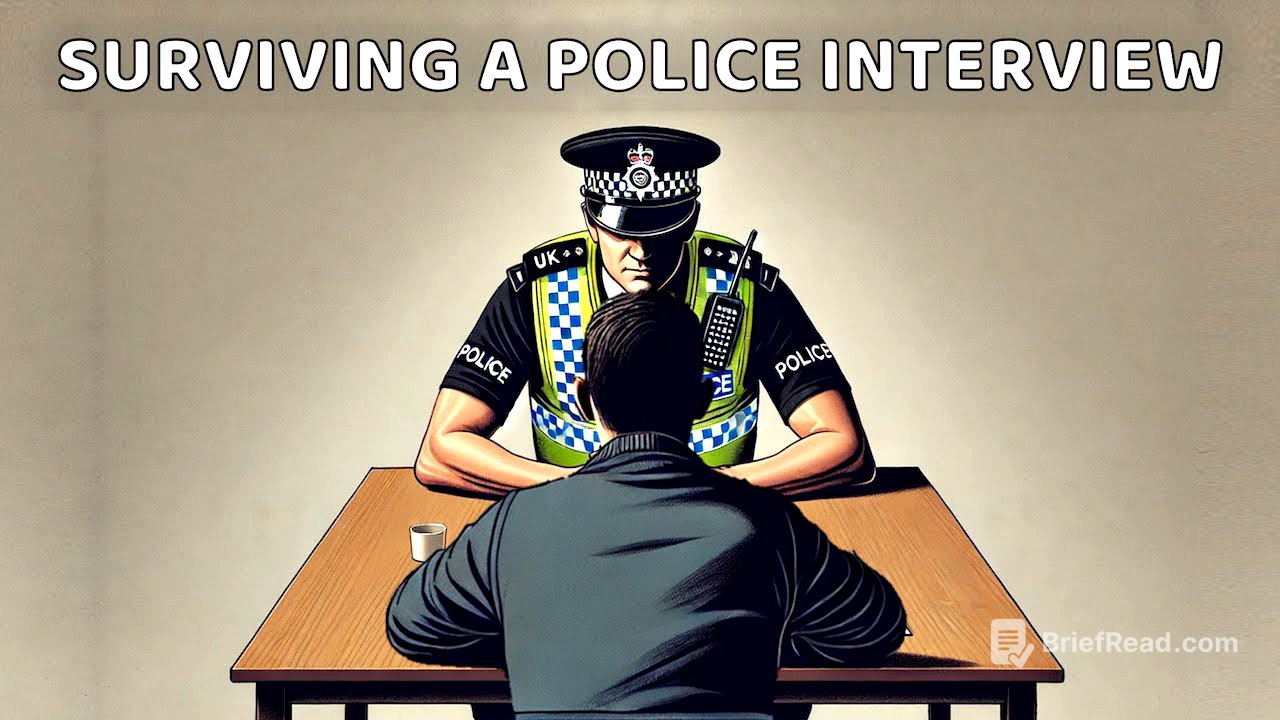TLDR;
This video provides an overview of the arrest and police interview process in the UK, offering advice on how to navigate it effectively. It covers your rights, the importance of legal representation, and strategies for handling police questioning. Key takeaways include understanding the caution, the right to a solicitor, and the potential outcomes following an interview, such as no further action, bail, out-of-court disposal, or being remanded in custody.
- Understanding your rights upon arrest.
- The importance of obtaining legal representation.
- Strategies for handling police questioning and interviews.
- Potential outcomes following a police interview.
Arrest Procedure and Initial Custody [0:30]
The arrest process can be either planned or spontaneous, but the procedure remains similar. The arresting officer must inform you of the reason for your arrest, the circumstances surrounding it, and the necessity for the arrest, while also issuing a caution. Upon arrival at the custody suite, you'll be placed in a holding cell while awaiting processing by the custody sergeant. Although the maximum custody time is generally 24 hours, this can be extended in exceptional cases with senior management approval. During this time, police officers will ask health and safety questions due to their responsibility for your well-being while in custody.
Custody Sergeant and Detention [3:06]
The custody sergeant reviews the arresting officer's justification for the arrest, focusing on its necessity. If the sergeant deems the arrest unnecessary or unlawful, you will be released. You will be asked if you want a solicitor, and it's advisable to say yes. While you can choose your own solicitor, duty solicitors are often more experienced with custody procedures. If the custody sergeant approves the detention, you'll be escorted to a cell, usually on your own unless you're considered a risk to yourself.
Waiting for the Interview [4:20]
If your arrest was planned, the officer in charge (OIC) likely has the interview prepared. However, for unplanned arrests, there may be a longer wait due to resource constraints. You can politely ask for updates on the situation. Once your solicitor arrives, they will engage in disclosure with the OIC to discuss the reasons for your detention and the available evidence.
Solicitor Consultation and Interview Strategies [6:04]
After disclosure, you'll have a private consultation with your solicitor, who may advise you to remain silent, tell the truth, or accept an out-of-court disposal. During the audio-recorded interview, the interviewing officer will review the reasons for your presence, confirm personal details, and reiterate your rights and the caution. A common interview strategy involves building rapport to encourage the suspect to talk, noting inconsistencies in their story compared to the evidence.
No Comment Interviews and the CPS [8:16]
If a suspect chooses to remain silent ("no comment"), the interviewer may try to elicit a response through emotive topics or by discussing the evidence against them. While remaining silent can be beneficial, it may lead to questions about why you didn't defend yourself earlier if the case goes to court. The Crown Prosecution Service (CPS) reviews the case and decides whether to charge the suspect, only doing so if there's a realistic prospect of conviction.
Post-Interview Outcomes [9:46]
Following the interview, there are four potential outcomes: no further action, release on bail, an out-of-court disposal, or being remanded in custody. Release on bail may be unconditional or have conditions, such as restrictions on contacting certain individuals. Out-of-court disposals are explained by the officer, and you can choose whether to accept them. Remand involves being held in custody until the next court date, typically reserved for serious offences or repeat offenders.









